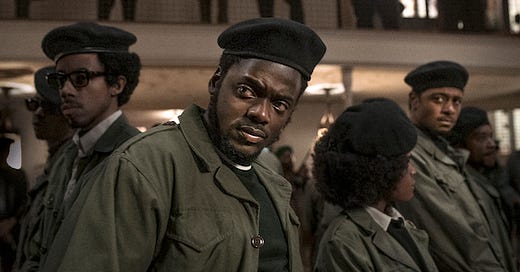ReelBob: ‘Judas and the Black Messiah’ ★★★½
A political drama that looks at the activism of Fred Hampton and Chicago's Black Panther party and the government's campaign to silence Hampton and the Panthers by any means necessary.
If you followed the news in the late 1960s and early 1970s, you probably believed this nation was under siege.
The Nixon White House, the FBI under J. Edgar Hoover, other government agencies and sometimes — I am sad to say — the mainstream media were bombarding the American people about threats from within — antiwar activists, hippies and, most ominously, militant groups such as the Black Panther Party.
Scare tactics were used to portray the Black Panthers as gun-toting thugs who hated white people and wanted to foment a revolution in the United States.
Mostly ignored were the party’s programs, such as food services for children and families as well as education classes for Black children and adults. Like Black activist groups today, the Black Panthers filled a need in Black neighborhoods underserved by those in power.
Which brings us to “Judas and the Black Messiah,” Shaka King’s film about Chicago Black Panther chairman Fred Hampton, his attempts to aid his people and William O’Neal, the Black FBI informant who betrayed him and his cause.
O’Neal (LaKeith Stanfield) is a car thief whose modus operandi is to flash a badge, claim to be an FBI agent and confiscate an individual’s vehicle.
One attempt goes wrong, and he is caught. Facing prison time, he is recruited by FBI agent Roy Mitchell (Jesse Plemons) to infiltrate the Panthers, get close to Hampton and report back to Mitchell on the group’s activities.
At first, Mitchell hangs O’Neal’s possible prison term over his head. He then switches to other tactics, realizing O’Neal has a greedy streak and wants a car and money.
Stanfield walks a tightrope as O’Neal. You dislike him, but — as he sees that, despite the rhetoric, the objective of Hampton and the Panthers is to help the Black community — he becomes ambivalent, believing Hampton is not the dangerous threat the FBI perceives.
Plemons is very smooth as Mitchell. While convincing O’Neal to help the agency, he compares the Panthers to the Ku Klux Klan, explaining that they differ philosophically, but their methods are similar — violence and intimidation. Mitchell soothes O’Neal’s hesitancy by telling him he is helping his people and the country.
Daniel Kaluuya gives a dynamic performance as Hampton. He is a fiery orator, preaching not only revolution, but black self-sufficiency.
And while not eschewing violence, he does remind people that they have the right to protect themselves and fight back against injustice.
Kaluuya’s Hampton truly believes in the righteousness of his cause. And, foreshadowing his future, he says he is willing to die for his principles.
If “Judas and the Black Messiah” has a weak spot, it is the performance of the always-reliable Martin Sheen as FBI Director J. Edgar Hoover. It’s ironic that Sheen, one of the most liberal and activistic performers in the country, is portraying Hoover.
And that may have colored his portrayal. His Hoover is venally cartoonish, preaching about a Black revolution and warning Mitchell about his infant daughter bringing home a Black man when she grows up.
Not satisfied with just putting Hampton in prison, Hoover intimates that he wants him killed. Now, whether that is true or just dramatic license by King and script coauthor Will Benson, is uncertain.
But it adds an unnecessary whiff of governmental conspiracy to the movie.
The Chicago Police Department also receives a black eye. Most of the white officers portrayed are trigger-happy racists. That may be an accurate portrayal of the department in that era, especially after the “police riot” during the 1968 Democratic National Convention.
Still, these are minor nitpicks and should not obscure the potency of “Judas and the Black Messiah.” Though the events of the film happened nearly a half-century ago, the issues they include — judicial inequities, racism, poverty and oppression — remain real struggles Black citizens continue to deal with today.
I am a founding member of the Indiana Film Journalists Association. I review movies, 4K UHD, Blu-rays and DVDs for ReelBob (ReelBob.com), The Film Yap and other print and online publications. I can be reached by email at bobbloomjc@gmail.com. You also can follow me on Twitter @ReelBobBloom and on Facebook at ReelBob.com or the Indiana Film Journalists Association. My movie reviews also can be found at Rotten Tomatoes: www.rottentomatoes.com.
JUDAS AND THE BLACK MESSIAH
3½ stars out of 4
(R), graphic violence, language, thematic elements




